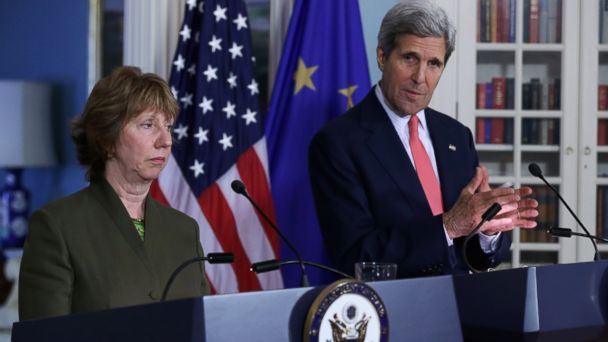Nigeria Wanted to Go It Alone to Find Kidnapped Schoolgirls, Kerry Says

European Union High Representative Lady Catherine Ashton, left, and U.S. Secretary of State John Kerry, right, are pictured on May 6, 2014 in Washington, D.C. Chip Somodevilla/Getty Images.
The United States did not provide assistance earlier to Nigeria to find 300 kidnapped schoolgirls because the country's leaders requested help only recently, Secretary of State John Kerry said today.
Nigeria had been following its own strategy but when Kerry spoke with Nigerian President Goodluck Jonathan today, he said he was "happy" to receive the United States' latest offer of American military and law enforcement personnel to join his government's efforts, Kerry said.
Related: What It's Like to Be Attacked by Boko Haram: A Survivor's Story
"You can offer and talk, but you can't do - if a government has its own sense of how it's proceeding. I think now the complications that have arisen have convinced everybody that there needs to be a greater effort," Kerry said.
The stepped-up American presence will be evident immediately, he added.
Related: How Nigeria's Most Famous Daughters Are Raising Their Voices to Bring Back Kidnapped Girls
Kerry, who made his remarks during a press availability with European Union High Representative Catherine Ashton, also touched on another struggling country in the region - South Sudan - where violence between the government of President Salva Kiir and former Vice President Riek Machar persists.
Kerry said the U.S. will impose sanctions on two individuals who have violated a cessation of hostilities agreement signed in January: the commander of the South Sudan presidential guard, Major Gen. Marial Chanuong Yol Mangok, and rebel general Peter Gadet.
Kerry also reiterated that he believes Kiir and Machar will meet shortly.
While events in Africa played an unusually large role in a meeting between diplomatic representatives from the United States and the European Union, there was still plenty of discussion of Ukraine, whose troubles affect both nations.
Kerry announced he will travel to London next week for a meeting with his 28 European Union counterparts to discuss the situation in Ukraine.
Both Kerry and Ashton said they were concerned about Russia's efforts to destabilize elections in Ukraine scheduled for May 25. Kerry said it was ironic that Russia supports Syrian President Bashar al-Assad's election while urging Ukraine not to hold its own.
"It's very hard to reconcile that Russia is now making the argument that Ukraine ought to reduce - not have an election or postpone an election because of the violence that's taking place, but Russia is full whole-hog behind having an election in Syria where there is far worse violence. Reconcile that one for us, please," he said.
Kerry also reiterated that the United States is not taking any specific efforts to sanction Russian President Vladimir Putin. "It's not because we have some personal thing," he said.
Finally, Kerry said he would comply with whatever is asked of him by House Oversight Committee Chairman Darrell Issa, who issued a subpoena for Kerry to testify on the Benghazi attacks.
"We will respond because there will be absolutely nothing to hide," he said.
But Kerry still plans on traveling to Mexico on the date Issa has currently subpoenaed him to appear.